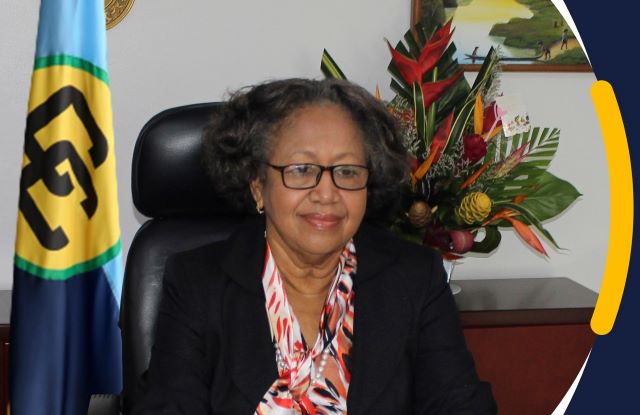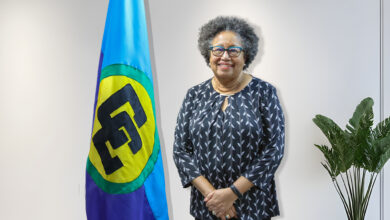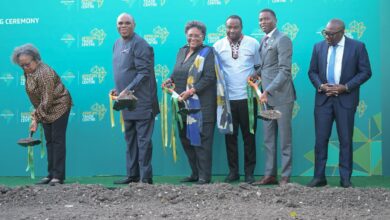- Honourable Kerrie Symonds, Minister of Energy, Small Business and Entrepreneurship of Barbados;
- Mr. Neil Corbin, President of the Barbados Small Business Association;
- Senator Dr. Lynette Holder, Chief Executive Officer of the Barbados Small Business Association;
- Dr. Deodat Maharaj, Executive Director of Caribbean Export;
- Presenters, Participants, Ladies and Gentlemen.
Greetings! I am really delighted to have the opportunity to speak with you today.

I would first like to thank the Barbados Small Business Association for inviting me to speak at this most important State of the Sector Conference 2021 on Micro, Small and Medium Scale Enterprises (MSMEs). In these highly uncertain and difficult times, the development and success of micro, small and medium sized enterprises will be a critical factor in charting a course for the Region out of the difficult social and economic situation brought on, in large measure, by the COVID-19 Pandemic.
This Conference is very timely and relevant, and I am delighted that it has a regional focus given the importance of this sector to all our economies. So, I congratulate the Barbados Small Business Association for providing a regional platform for dialogue and exchange of information on the prospects for MSMEs and their role in the recovery process.
As I am sure we will hear throughout today’s programme, MSMEs in the Caribbean region, much like the rest of the world, have been severely impacted by this global pandemic. Many firms were forced to shut their doors for prolonged periods of time due to recurring lockdown measures. Many lost employees and customers due to the slowdown in economic activity. Many MSMEs will not be able to survive and recover without support.
The pandemic has exacerbated the difficulties faced by our regional economies. The International Monetary Fund and other multilaterals have agreed that our Caribbean Region is the worst affected economically in the world by the pandemic, given our heavy dependence on the travel and tourism sectors. Estimates of revenue losses associated with the pandemic average between 30 to 40 percent.
Predictions speak to a recovery by 2023 at best, and that is dependent on an adequate supply of vaccines, as well as enough of the population being inoculated to achieve herd immunity. The imperative for vaccination is driven by both health and economic factorse. The longer we take to vaccinate, the more we see our health sector devastated and the more we delay economic recovery. This threatens the viability of all businesses including MSMEs.
Madame Chair, the Revised Treaty of Chaguaramas enjoins the Caribbean Community to adopt appropriate policy measures to encourage the development of competitive MSMEs in Member States, through a facilitative legal economic and administrative framework.
In that regard, in 2017, the Council for Trade and Economic Development (COTED) approved the Regional Policy for MSMEs. It is designed to promote harmonisation of the sector by integrating it into the policy framework of the CARICOM Single Market and Economy (CSME). The Policy outlined key principles, specific measures, and programmes to improve the productive capacity, competitiveness, profitability and sustainability of the MSME Sector and, by extension, increase wealth creation and employment opportunities.
This is in recognition of the crucial role of MSME’s in the economic development of the Region. Our Member States follow the global trend where MSME’s employ more persons than larger businesses and contributes more than 70% of GDP. In Barbados alone, the SBA reported that MSMEs account for approximately 92% of formal enterprises and over 60% of private sector employment. Importantly, it is a primary employer for women, youth and vulnerable groups. Your businesses are a major driver of the Region’s economies, creating jobs, taking advantage of emerging opportunities and assisting in driving economic growth and social stability.
Therefore, we must devise strategies to support the sector to enable these enterprises to survive the effects of the pandemic and be active participants in the recovery process. As the bedrock of entrepreneurship, MSMEs are essential in the building of a socially and economically resilient Caribbean Community.
In making that journey to resilience, we have to create an environment that harnesses and encourages innovation and creativity, risk-taking and boldness. These are characteristics with which our people are generously endowed and must now be employed in a focused manner to our advantage.
In striving for competitiveness and searching for avenues to expand the range of possibilities for MSMEs to grow, I would like to suggest some areas which may bolster the “enabling environment”.
The Region has unfortunately lagged behind global trends in adopting technology, digitisation of business and e-commerce. The potential of the Single ICT Space has yet to be realised. Last Tuesday, in launching the CARICOM Digital Skills Task Force, I noted that “before the pandemic, digital skills were valued, but now they are vital to keep up with the growing trend of the virtual world in which we live and must thrive. Strong collaboration is needed between the public, private and civil society sectors, to promote learning and skills delivery in different environments, and make it accessible and inclusive to all. The private sector is well-positioned to help meet and expand this increasingly urgent, and unmet need and demand.”
The bottom line is that digitisation of business and e-commerce are essential to building innovative, competitive and resilient MSMEs. In fact, we have seen over the course of the pandemic, that firms and consumers shifted their focus towards digital and online channels to conduct business.
Digital business allowed MSMEs to continue operations, earn income, and remain solvent during the pandemic. Consumers themselves sought to source their products and services online, including digital services, such as music, online education and gaming. Firms that made the transition were able to survive and, in many cases, thrive.
As a Region, we need to sustain this push towards digital business and move the existing bottlenecks that exist. The Inter-American Development Bank noted that many countries in Latin America enacted several measures to strengthen business continuity and resilience through digital trade, including improvements in digital and physical connectivity, availability and uptake of digital tools, and the development of digital skills and abilities. This was done via a combination of enhancing existing national MSME strategies, reallocation of resources or the development of new e-commerce strategies prompted by the need to respond to the pandemic.
Our Community is advancing its Digital Agenda. In the coming year, the CARICOM Secretariat will embark on an ICT Sector gap analysis across CARICOM, with funding provided under the 11th European Development Fund (EDF). This gap analysis will support the recovery efforts of the Region, through the identification and quantification of critical parts of our digital infrastructure and help to fast-track digital transformation.
The Digital Task Force will provide technical guidance on the development of digital skills and capability levels across CARICOM. I urge organisations, such as Small Business Associations across the Community to become engaged in the work of the Task Force, both to enhance skills and to glean knowledge to improve the conduct of your businesses.
As our Region strives towards the goal of being resilient, one of the main factors inherent in sustainability is renewable energy.
The Caribbean region faces some of the highest energy costs in the world. Most of us are energy importers. CARICOM countries possess immense renewable resource potential – including biomass, geothermal, hydro, marine, solar and wind. The aggregated contribution of renewable power to the electricity sector within the Region has improved, doubling over the last decade – from around 6% in 2010 to around 12.3% in 2019. The target is for 47% by 2027. However, renewable energy deployment remains below par, and there is much more that needs to be done for consumers and businesses to benefit from lower prices and improve their competitiveness.
If CARICOM countries invest optimally in renewable energy generation, they could save US$5.7 Billion in generation costs from 2020 to 2040, increasing the share of renewable generation by a factor of almost four, while reducing electricity costs, oil imports, and CO2 emissions. The Region needs to continue to promote the use of green energy in MSMEs through, for example, provision of tax incentives for green energy adoption and blended financing options for the capital costs associated with transitioning to renewables.
Common approaches across the Region will lower learning and transaction costs for private suppliers and investors, broadening the market, increasing competition, and benefiting Caribbean consumers.
Chair, it is no secret that for many MSMEs, the major issue they face in growing their businesses, even before the pandemic, is limited access to financing. Now more than ever, access to finance is a critical success factor to aid recovery and building resilience.
Collateral requirements combined with de-risking policies have raised not only borrowing but also operational costs to many MSMEs, leading to the de-banking of some small businesses operating in what were considered to be high risk sectors. The provision of financing options for MSMEs could include promoting private equity financing, grant funding, loan guarantee systems, promoting diaspora financing and establishment of government backed lending and trade financing programmes. This is of critical importance to MSME development in the Region and it is an area that needs to be one of focus.
The Region needs to also focus on building a business environment that promotes MSME development. A quick review of the latest Ease of Doing Business Index reveals that all countries in the Region, with the exception of Jamaica, rank in the bottom half of the index. The Region’s private sector faces many bottlenecks related to cross border trade, enforcement of contracts, inadequate legislative and regulatory frameworks, as well as starting and registering a business. The index illustrates that entrepreneurs face sometimes unnecessary obstacles. We need to continue to advocate with our policy makers to ensure that our business environment is one that works for our MSMEs.
Ladies and gentlemen, as I conclude, our Community has been buffeted by the ill wind of COVID-19 over the past 18 months. You as businesspersons have faced numerous challenges brought on by this pandemic, yet you are proving resilient and adaptable, whilst tapping into new opportunities. I encourage you to stay the course, since we can only become a resilient Caribbean by working together and recognising that we must all play our part with business having a central role in creating jobs, growth and opportunity for our people.
It is this context that you, in the MSME sector, have a special role and deserve directed attention, given the unique contribution you continue to make to building a Resilient Caribbean. I am committed to fully support this agenda.
Congratulations again to the Barbados Small Business Association and the organisng team for bringing us together from across the Region on this critically important matter. I wish you every success.
Thank you very much.






